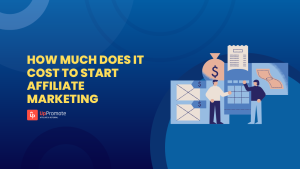If you want to step up your digital marketing game and expand your customer base, you’ve got options. This article will guide you through two paths: Affiliate Marketing and Referral Marketing.
Though they might look alike at first, there are crucial differences. We’ll explore these distinctions and offer insights on when to choose each type of partnership. Stay tuned to find the best fit for your goals!
Affiliate Marketing vs. Referral Marketing: Key Differences You Should Know
People often mix up affiliate marketing and referral marketing, but they’re distinct.
The key difference is in how they work for both customers and businesses. Affiliate marketing teams up with external partners to boost sales, while referral marketing depends on happy personal recommendations to grow the customer group and increase customer lifetime.
In short, they have their unique flavors. Explore the table below for a closer look at the differences.
| Criteria | Affiliate Marketing | Referral Marketing |
| Participant | Partners | Happy customers |
| Target audience | New & existing customer | Existing customer |
| Goal | Sales & Traffic | Sales & brand loyalty |
| Approach | Multi-faceted | Personalized communication |
| Potential reach | Huge: Can reach a broad audience through diverse affiliate marketers | Limited: Mainly focused on pre-existing relationship customer networks |
| Reward for participants | Cash, store credit, discount, voucher | Cashback (store credit), discount |
| Skill requirements | SEO, ads, content writing (varies by type of affiliates) | None: Participants simply share personal experiences or refer others |
| Relationship Building | Focus on partnerships and business relationships with affiliates | Leverage existing customer satisfaction and loyalty |
| Feedback Mechanism | Performance metrics like clicks, conversions, and sales are closely monitored | Rely on customer feedback and satisfaction with the referred products or services |
Participant
First off, affiliate and referral marketing involve different participants.
In affiliate programs, external partners (influencers, bloggers, content creators, social media platforms personalities, and website owners) promote products to a broader audience for more sales and brand visibility.
Like @kalie_ho, a lifestyle and beauty blogger on Instagram, collabs with a Medicube brand to promote its Age-R Booster-H product.

In contrast, referral programs rely on existing customers or employees recommending products to friends, building a loyal customer base through trusted connections.
Target audience
Referral marketing works best when the person recommending (customer) already knows the person they’re referring to (potential new customer). This could be friends, family, or colleagues, and the trust in their pre-exsiting relationship makes the referral more effective.
Tend, a dentistry business with many locations on the East Coast shows a good example of this. It’s good to have a classic referral plan if it’s a regular dentist’s place.
But if it’s a dentist spot with many locations and a bigger group of people they serve? That’s when a referral affiliate plan is really useful.
Tend is saying, “Hey, if you tell someone about us and they come in, we’ll give you a $50 Amazon gift card.” They want everyone to share their services, even if they’re not super close to the brand.

In affiliate marketing, there’s no need for a direct relationship between the person recommending (affiliate) and the one being referred to (potential customer).
The person clicking the affiliate link doesn’t have to know the affiliate personally, but there’s usually some trust involved.
For example, people who follow a YouTube channel, newsletter, or podcast may not know the host personally but trust their recommendations from people based on the content’s quality. Affiliate marketing success depends more on the affiliate’s perceived credibility than personal connections.
Goal
In affiliate marketing, the main goal is to sell more and get more people to visit a website. Think of influencers or bloggers as online superheroes using special links to promote a brand. They earn referral rewards when people buy through these links, aiming to grow the customer group and boost sales and website visits.
Conversely, referral marketing is like building a friend circle and selling more stuff. Current customers act like matchmakers, telling their friends or family about a brand using special referral links.
Successful referrals bring in more sales and create strong bonds with the brand. When trusted people recommend something using referral codes, it makes customers stick around, forming a group of loyal fans. The idea is to increase sales and build lasting connections through good experiences.
Approach
Affiliate programs have a multi-faceted direct approach. Depending on the type of affiliates, they involve various strategies like SEO, ads, and content writing. It’s like using many different tools to reach a broad audience.
Top Cash Back is a type of website that falls into the category of affiliate coupon sites.

While referral programs take a more intentional approach. It’s about participants sharing their own experiences or recommending others. The focus is on individual, direct communication, creating a more personal connection with friends, family, or colleagues.
Potential reach
Think of affiliate programs as having many helpers. They can talk about your stuff in many different places, reaching many people. So, the potential reach is huge because of the diverse group of affiliates.
Now, with referral programs, it’s more like your customers are the heroes. They mainly talk to people they already know, like friends or family. It’s a bit limited compared to affiliates, but it’s focused on already connected folks.
Reward for participants
For referral programs, incentives are the driving force that encourages people to spread the word about your business. Even if someone is already a fan and talks about your business naturally, appealing rewards keep them motivated to refer others.
Referral bonuses can take the form of discounts, store credit, coupons, cash back, or gift cards, and they can be for the person making the referral, the new customer, or both.
Gilt is a shop that sells fancy clothes at lower prices. They have nice stuff for men, women, and kids, special services and luxury travel. If you tell friends about Gilt using your special link or QR code, you and your friend get a $25 gift card. Easy ways to spread the word!

Now, in affiliate programs, it’s a bit different. Affiliates generally expect cash rewards for each sale they bring in, like a bonus.
This could be a fixed amount or a percentage of the sale. Sometimes, they might also receive a free product, especially if they’re performing well or have been affiliated with the company for an extended period.
Skill requirements
Affiliate programs might need different skills like understanding SEO, handling ads, and writing content. The skills required can change based on the type of affiliates – some are good at SEO, some at creating ads, and others at writing engaging content.
On the other hand, referral programs usually don’t need any special skills from participants. People involved can share their experiences or recommend others without needing specific expertise.
In referral programs, it’s more about honest recommendations and personal connections than having specific skills.
Relationship Building
Affiliate programs thrive by forming partnerships and business connections with affiliates. It’s like teaming up with others, working together to promote and sell products, and creating a network of partnerships that benefit everyone involved.
On the flip side, referral programs concentrate on tapping into the satisfaction and loyalty of existing customers. It involves nurturing the connection with current customers, urging them to share their positive experiences and recommendations with people they know. The focus is on using the trust and contentment of existing customers to broaden the network.
Feedback Mechanism
For affiliates, it’s like tracking how well things are going—checking clicks, conversions, and sales to see how the affiliates are helping the business.
In referral programs, it’s more about hearing from customers directly. It’s about finding out how happy they are with the stuff they’ve recommended to others. The goal is to get customer input to make sure they’re happy and to improve the referral process.
What is Affiliate Marketing and How Does It Work?
Affiliate marketing is a performance-driven strategy where individuals (affiliates) are motivated to promote your products or services in exchange for a commission.
The key players in this process are merchants (businesses selling products/services), affiliates (those promoting the merchant’s products to their audience), and customers (consumers within the affiliate’s target audience).
Here’s how it works:
- Collaboration: You and the affiliate partner up directly or through a third party.
- Affiliate Promotion: The affiliate shares your product or service with their audience, usually through a referral link or coupon.
- Engagement: Potential customers interact with the affiliate’s link, showing interest in your offering.
- Landing Page Visit: The customer lands on your page to learn more about the product.
- Purchase: The consumer decides to buy your product.
- Commission Earned: The affiliate earns a commission for driving the sale.
The key to a successful affiliate program is finding supporters who can tell others about your product and make them want to buy it. These supporters aren’t usually friends with the customers, which makes it different from referral programs. Businesses can work with affiliate partners to bring in many new customers.
Affiliate marketing pays affiliates for each sale they bring in, so most focus on spreading a broad message to consumers. They use common advertising methods like SEO optimization, PPC, email marketing, content marketing, and display advertising. The affiliate’s job is to generate sales for your business.
Pros of Affiliate Marketing
About 81% of brands use affiliate marketing to get people interested and make more money. In the US, affiliate marketing accounts for up to 16% of all eCommerce sales.
These numbers show how using this marketing approach can help businesses do well.
1. Get More People to Know Your Brand
When partnering with affiliates, merchants can significantly enhance their brand visibility. Affiliates, who generally promote products or services to their audience, play a pivotal role in increasing exposure for the merchant.
Through content creation and social media sharing, affiliates effectively amplify the merchant’s reach, spreading the word about their offerings.
2. Cost-effective with high ROI
Operating on a performance-based model, affiliate marketing stands out for its cost-effectiveness and impressive return on investment (ROI).
Unlike traditional advertising campaigns, merchants only incur costs for actual sales.
3. SEO and Traffic Enhancement
Surprisingly, affiliate marketing contributes to improving a brand’s website SEO and increasing traffic.
Affiliates generate content that includes links directing back to the brand’s website, resulting in a surge of valuable backlinks. This positively impacts off-page SEO scores and drives more traffic to the website through the shared affiliate links.
4. Gain more exposure
Having affiliates gets you more exposure and makes your brand more trustworthy. The more affiliates you have, the more reviews your products get. People trust products with many good reviews from real users more than those just advertised.
Cons of Affiliate Marketing
While affiliate marketing has its benefits, it also has some downsides.
1. Quality Control
Sometimes, in affiliate marketing, it’s hard for businesses to make sure everyone talks about their stuff similarly.
Affiliates do their own ads and messages, which can lead to confusion. When the message isn’t the same everywhere, customers might get mixed up about what the business is really about. This lack of control can make customers unsure about trusting the brand.
2. Fraudulent activities
Most affiliates are honest, but some might use tricky methods to sell more and make extra money. They might use ads that don’t tell the truth or do things that are not fair. This not only hurts the business’s money but also makes people not trust the brand anymore.
If customers find out they were tricked, they might stop believing in the brand.
To stop this, businesses must watch affiliates closely and tell them exactly what’s okay and what’s not. Checking regularly can help catch any tricky stuff early on.
What is Referral Marketing and How Does It Work?
Referral marketing, on the other hand, is all about your customers telling their friends about your brand. Your current customers become promoters, sharing your brand with new users to earn rewards for themselves and their friends.
Successful referral campaigns make it easy for happy customers to naturally spread the word to their family, friends, and colleagues. It’s like turning your satisfied customers into active brand ambassadors.
This helps your business get more customers and rewards users for being a part of it.
Unlike affiliate marketing, referral programs are based on personal connections. It’s similar to running into a friend on the street who shares a cool tip with you. Often known as word-of-mouth marketing.
So how does referral marketing work?
In a referral program, people get rewarded for telling others about a product. They can do this online at events on social media or offline.
For online stores, when someone new buys using a recommendation, the person who referred them gets a reward, like a discount or gift. It’s a way to make everyone happy!
Brand ambassadors in the program get a special code or link. When someone uses it to buy something, the ambassador gets a reward.
For example, Airbnb, the big internet stay place, had a cool program offering US$18 per stay and US$10 per experience for referrers, and up to US$46 in account credit for referees.
The Airbnb program made more people book stays – 25% more, and the latest version got 300% more referrals. It worked because they made it easy for people to use and focused on friends sharing with each other.
Pros of Referral Marketing
Referral programs are a budget-friendly way for advertisers to get new customers and keep them, especially when compared to other marketing methods and loyalty strategies.
1. Trust and Credibility
Recommendations from friends, family, or colleagues are often more trusted than traditional advertising. Referral marketing leverages existing relationships and the trust established between referrers and their network.
2. Higher conversion rates
Referred customers often have higher conversion rates and a shorter sales cycle. They may already have a level of trust in the brand, making them more likely to make a purchase.
3. Customer loyalty
Encouraging customers to refer others can strengthen their relationship with the brand. It makes them feel valued and connected, fostering a sense of loyalty.
Cons of Referral Marketing
1. Dependency on existing customer base
For businesses with a limited customer base, relying solely on referrals may not be sufficient for growth. It’s important to diversify marketing strategies.
2. Limited reach
Referral marketing relies on existing social circles, which may limit the reach to new, untapped markets. It might not be as effective in reaching wider audiences or expanding the customer base beyond existing networks.
What are the Similarities Between Affiliate Marketing and Referral Marketing Programs?
Affiliate and referral marketing programs may differ, but they have some things in common. The main thing is that both want people to talk about a brand and usually give a reward for each sale.
Based on social currency
Both referral and affiliate marketing programs aim to get new customers, but there’s a risk if those new customers don’t like the product or have a bad experience.
In referrals, existing customers suggest the product, assuming it’s good because they’ve tried it. In affiliate marketing, the link is put on public platforms, and people click based on trust in the affiliate’s reputation.
So, while both involve risks, referrals rely on direct experiences, and affiliates depend on trust built online. It’s important to manage customer experiences to keep trust for both programs to work well.
Cost-effectiveness
Both programs operate on a performance-based model, where rewards are given only when a desired action is completed.
If you’re using a referral or affiliate software instead of a network, these programs are more budget-friendly compared to other marketing methods. They also involve less financial risk than paying for ads because you only pay when a sale is made.
For referral programs, you pay for the software and only shell out when a referred customer makes a purchase. You have complete control over the rewards you offer.
With affiliate programs, you pay for the software and only spend money when someone clicks an affiliate link and buys something. While you need to pay affiliates in cash, you have control over the commission amount.
Incentive-driven
The third similarity is that these methods use rewards to motivate people to promote a product or service.
In referral programs, customers are encouraged to refer others by offering rewards, such as discounts or bonuses, for successful referrals.
Similarly, affiliate programs provide commissions or a cash-based incentive to individuals or businesses for driving sales or leads through their promotional marketing efforts.
In both cases, using incentives serves as a powerful motivator to engage and encourage participants to actively promote the business.
Repeatable Marketing Strategies
Affiliate and referral programs aim to grow steadily by getting others to talk about them, bringing in new customers, and increasing customer revenue. They rely on outside help to make this happen.
Referral programs intend to create strong connections with customers, encouraging them to tell and reward their friends. These programs may not attract as many people as affiliate programs, but the leads they bring in are usually better quality and more likely to make a purchase.
Affiliate programs often share links in popular content like blogs or social media posts. While there might not be direct interaction with potential customers, anyone already interested in your product or service can easily click these links.
Affiliate Marketing vs. Referral Marketing: Which is the Right Choice?
Choosing between affiliate marketing and referral marketing depends on what your business needs. There’s no one-size-fits-all answer. Each has its own strengths, and it’s about finding the right mix for your brand.
Affiliate marketing is good when you want external partners, like influencers or bloggers, to help you reach more people. They get paid for driving sales or leads, making it great for expanding into new markets.
Referral marketing focuses on your current customers. It’s about getting them to recommend your products or services to others. This works well when trust and relationships matter, and it’s cost-effective for bringing in new customers.
You can use both strategies together for a balanced approach. Affiliate marketing helps you reach new audiences, while referral programs keep your current customers engaged. The key is understanding your business goals and adjusting your marketing strategy to fit what works best for you.
FAQs about Affiliate Marketing vs Referral Marketing
Q: Is referral marketing profitable?
Yes, referral marketing can be profitable. By leveraging existing customers to bring in new ones, businesses can acquire customers at a lower cost, benefiting from word-of-mouth recommendations and increased trust.
Q: Is referral marketing legal?
Yes, referral marketing is legal when conducted ethically and complies with relevant laws and regulations. It’s essential to ensure transparency, obtain consent, and adhere to data protection and privacy laws.
Q: What’s the difference between an affiliate link and a referral link?
The main difference is in the purpose and context. Referral links are typically used in referral programs among existing customers, while affiliate links are often associated with external partnerships where individuals earn commissions for driving sales or leads to a business.
Q: When to use affiliate marketing and referral marketing?
You can use affiliate marketing when seeking external partners to promote your products for commissions. Use referral marketing primarily with existing customers to encourage them to refer friends. Both can be effective, but the choice depends on your goals and target audience.
Wrapping up
After learning about both referral and affiliate marketing programs, you might see that they’re like powerful tools for your business. You can use them in different ways based on your goals.
These programs help spread the word about your business, connect with interested people, and boost sales. You decide if you want to use one or both. The key is to have a clear plan, use the right tools, and check if your program is working well and giving you good results.








